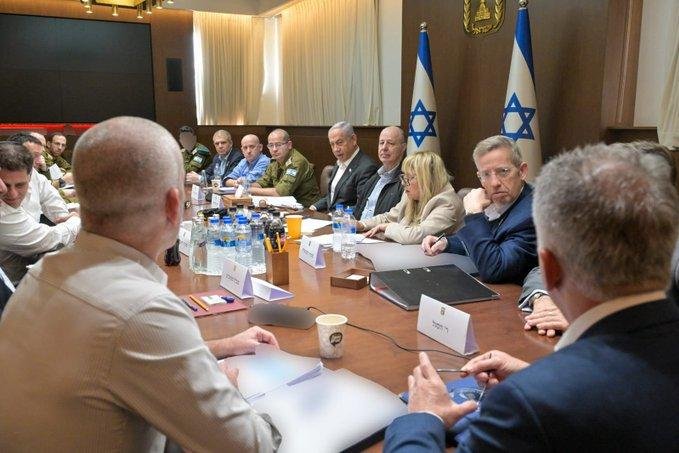Israeli Prime Minister Benjamin Netanyahu (C), chairs a meeting Friday morning of his security cabinet which was expected to vote in favor of a deal with Hamas for a cease-fire in Gaza and the release of Israeli hostages being held in the Palestinian enclave. Photo courtesy of Israeli Prime Minister’s Office/X
Jan. 17 (UPI) — Israel’s security cabinet approved a cease-fire deal with Hamas that will see the release of all hostages held by the Palestinian group, sending it to the broader government to weigh for approval.
Israeli President Isaac Herzog confirmed the step in a post on X.
The pact must still be signed off on by Israel’s full cabinet.
“I welcome the Israeli Security Cabinet’s decision to approve the hostage deal which will bring our hostages home, as presented by the prime minister and the negotiating team. I expect the government to follow suit in swiftly affirming this decision,” Herzog said in a translated statement on X.
“This is a vital step toward fulfilling the highest covenant between the state and its citizens. There is no greater moral, human, Jewish, and Israeli duty. We must bring all of our hostages back home.”
Earlier Friday, Israeli Prime Minister Benjamin Netanyahu‘s office confirmed the agreement that is scheduled to go into effect Sunday.
Netanyahu’s office confirmed negotiators on all sides signed the agreement in Qatar, after a delay. The prime minister accused Hamas of attempting to make last-minute changes, resulting in a 24-hour delay of the vote.
The vote in front of the full Knesset is not expected to take place until Saturday night, making it likely the first three female hostages will now not be freed until Monday, instead of Sunday.
The time lag was due to the Shabbat, the Jewish day of rest which runs sunset Friday through sunset Saturday, and the need to allow time after that for the High Court of Justice in Jerusalem to rule whether petitions seeking to mount legal challenges to the deal are admissible.
The delays sparked anger among the family members of about 100 hostages still being held in Gaza, of which 33 are to be released in the initial six-week phase of the agreement, who argued the delay could see more deaths among their loved ones and that preserving life should outweigh religious dogma.
Fears that far-right members of the security cabinet Itamar Bezalel Smotrich and Ben Gvir, who are against the deal, would resign if it was adopted also appeared to have subsided after they indicated they would not back any opposition effort to bring down Netanyahu’s coalition in protest.
Gvir had urged supporters to rally against the deal.
“I am even more terrified. I call on my friends in the Likud and in religious Zionism, it is not yet too late, we are before a government meeting, we can stop this deal, join me, we can stop it,” Gvir said on X.
However, Gvir and Smotrich were said to be lending their backing on the condition that Israel resumes its war on Hamas when the phase expires in six weeks’ time.
U.S. President Joe Biden unveiled the deal to halt the 15-month conflict on Wednesday in Washington in a fanfare of publicity with Qatari Prime Minister Mohammed bin Abdul Rahman Al Thani making a separate announcement in Doha where representatives of Israel, Hamas, the United States and Qatar had been engaged in Intense negotiations.
Despite the showing, violence has intensified with the Israeli Security Agency saying the country’s forces struck 50 targets in Gaza during Thursday alone.
Gaza civil defense spokesman Mahmoud Basal told the BBC that more than 100 Palestinians had been killed in the attacks, 27 of whom were children.
At least 46,788 Palestinians have been killed and 110,453 injured in Gaza since the conflict started on Oct. 7, 2023, when Hamas and other jihadist groups attacked southern Israel, according to the Hamas-run Gaza Health Ministry.
